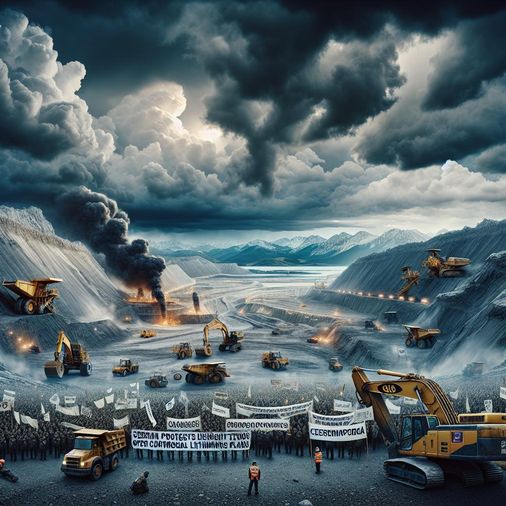Serbian Protests Highlight Tensions Over Controversial Lithium Mining Plans

Lithium, a critical ingredient for electric car batteries, is increasingly in demand around the globe. The Jadar Valley in western Serbia is home to the largest European deposit of this lightweight metal, and both the Serbian government and the European Union Commission have plans to exploit these resources. Despite the government's assertion that lithium mining could attract investments of six billion euros, improve wages, and enhance pensions, significant pushback from the Serbian populace has emerged. Environmentalists assert that lithium mining poses severe risks to both the environment and public health, particularly through the contamination of groundwater with heavy metals that threaten local drinking water supplies.
This discontent reached a peak on Saturday when tens of thousands of Serbians gathered in Belgrade to protest the lithium mining plans. Under the banner "There will be no mines," demonstrators flooded a central square, with reports indicating that between 24,000 to 27,000 participants were present, as estimated by local police. Organizers included a coalition of environmental protection groups, who also led demonstrations across more than 40 cities in Serbia in recent days. Some protesters went so far as to occupy train tracks at two stations, prompting Interior Minister Ivica Dacic to label these actions as serious breaches of public order. He vowed to pursue reports for criminal and administrative violations against the protesters.
Interestingly, the Serbian government had previously halted lithium mining two years ago under pressure from environmental activists but recently resumed its plans. During a high-profile visit by German Chancellor Olaf Scholz, a letter of intent was signed with EU Commission Vice President Maros Sefcovic, proposing conditions for ‘environmentally friendly’ mining. This strategic move aims to diminish Europe's reliance on lithium supplies from China, which currently dominates global mining and processing.
Critics have focused their ire on the Australian mining giant Rio Tinto, involved in the mining project. Allegations suggest that a study claiming minimal environmental impact was based solely on data provided by the company itself. Adding to the controversy, Rio Tinto has previously faced accusations of fraud in Mozambique and other penalties in Australia related to environmental compliance.
The protests also featured voices from the arts, notably actress Jelena Stupljanin, who questioned the priorities of nationalism and urged the public to consider whether supporting a multinational corporation was truly a patriotic act, or if true patriotism lay in the fight for clean air, land, and water.
Chancellor Scholz, while facing criticism during his visit, supported the Jadar project, arguing that it would benefit both Serbia and the region. He maintained that the critical dialogue is no longer about if lithium will be mined in Europe—much less Serbia—but rather how to carry out such mining responsibly. As the debates rage on, it is clear that the issue of lithium extraction in Serbia resonates far beyond mere economics, touching upon questions of environmental sustainability, public health, and national identity.
Related Sources:
